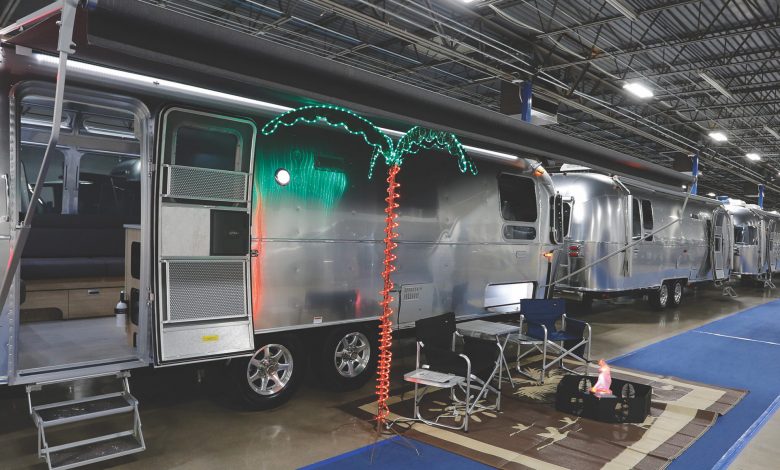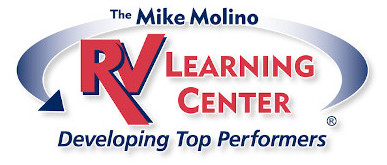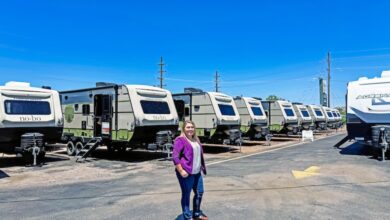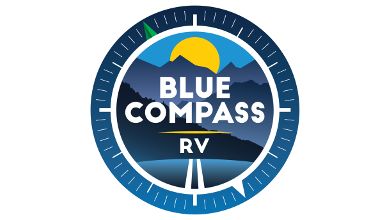Texas-based Vogt RV Eyes Fifth Location

In a tall glass, combine the following: manufacturer dedication and support, dealer best practices, a customer-first culture and a knack for adapting to the ever-evolving RV industry. Shake, don’t stir, and serve over some cool Texas business savvy with a twist of ingenuity. It’s what Vogt RV Centers in Fort Worth has been mixing and serving for decades and generations with a zest that has propelled growth and expansion.
“We’re committed to being different,” says President Aaron Vogt, nephew of founder and retired CEO Danny Vogt. “Just because we’ve been in business for 40 years doesn’t mean we have to operate the same way for the sake of doing things the same way. We know and realize change is inevitable.”
In many ways, Vogt RV is the agent of change.
The family-owned business recently added a third location last year exclusive to Airstream and is on the cusp of further expansion.
“My goal is not to be the No. 1 dealer in America – it’s to be the best dealer in America, which has naturally and organically allowed us to grow,” Vogt says.
Gross annual sales are more than $75 million.
“Our growth rate has averaged north of 15 percent for quite a few years now. Compounded together, that means we’ve more than doubled in just the past handful of years,” Vogt says.
In addition to the dealership’s Airstream exclusive store, Airstream of DFW, Vogt RV also has a Jayco-exclusive dealership and its original motorhome store. Throughout the 1990s, that location had been the top-selling RV dealership in Texas for many years, although it has recently been reincarnated into a service center and motorhome prep facility.
“Last year we doubled our staff, tripled our parts staff, tripled our service management, and have nearly doubled our technicians,” Vogt says. “We also elected to make the original store an all-service location, which is a reflection of our dedication to customer service and our manufacturers to make sure we’re the best dealer for them. We’re a three-legged stool of manufacturer, dealer and customer, so we decided to transform that dealership to service as the fastest way to bring warranty processes and systems up to speed. It’s the evolution of our business.”
He adds that service scheduling has precipitously dropped from up to eight weeks to one day.
“We can likely get you in today, whether you bought from us or not,” Vogt says.
Capitalizing on F&I
Helping to fuel that growth is also a well-oiled finance and insurance department driven by Finance Director David Newland and his two managers.
“Other than gross profit made on the sale of units, we’re the second-largest income-generating source of the dealership,” Newland says. “It far surpasses service, as well as parts – it’s huge.”
In July, 52 percent of Vogt’s profits were generated by sales and 48 percent was attributed to finance.
“Not enough dealers are capitalizing on finance as a profit center, largely because they lack the right personnel,” Newland says. “It can be a very stressful position – if you make it stressful. When completing a $300,000 closing, you better make sure the deal will get funded by the bank, and the only way it’s going to get funded is if the proper paperwork is submitted.”
Newland notes that many dealer owners and management shy away from finance for that reason and will often do the finance and insurance themselves.
“First and foremost, dealers have to find staff who are genuinely interested in protecting their interests and, second, becoming profitable,” he says.
There’s also a misconception that financing is “funny money.” “It’s not funny money; it’s genuine income,” he says. “Yes, there are chargeback periods, but our chargeback amounts to about 5 percent of what’s generated in this department, which is in excess of $5 million annually, so we retain much of that.”
Newland started in the industry in 1974, washing trailers at age 15, then proceeding to college and joining the financing world upon graduation. He’s been at Vogt RV for nearly 27 years and he’s seen many changes, including the increased paperwork, largely due to government regulations.
“It all changed in 2009 with the financial crisis and when the Dodd-Frank Act was put into place,” he says. “We have to cover our bases and meet the Fed’s regulations, as well as truth-in-lending disclosures and privacy notices. It’s not necessarily more challenging, but you have to pay attention to the documentation to meet lender and federal requirements and stay on your toes. Not everybody is up to it.
“The ultimate goal is to protect the interests of the dealership with proper paperwork so there’s no liability.”
Customize Ancillary Product Plans
For finance managers seeking to grow their business, Newland advises they avoid both stereotyping clientele and having a canned presentation, which he says is becoming prevalent in the industry.
“It’s detrimental,” he says. “Don’t pitch and present your products the same way to every customer. You must be able to ‘read’ each individual, know their background, and compile your ancillary products to fit their wants, needs and desires. Eye contact, gestures and verbal and non-verbal communication are key – are they looking at each other or at me?”
Clients must be commended for their ability to pay cash for an RV, but finance managers must also know how to show customers how their cash can continue to grow for them, he says, adding that it’s been very successful for Vogt and its customers.
“Financing on a depreciating asset is far more advantageous to a customer’s portfolio than liquidating their cash, though I always recommend putting enough cash into their RV so they remain in an equity position in case they had to have a ‘fire sale’ and needed to get out of it.”
Ancillary products such as service policies, tire and wheel, GAP, roadside assistance, paint and fabric, etc., must be presented in a manner that illustrates their benefits in protecting a customer’s RV investment.
“It gives them peace of mind,” Newland says. “We look after their investment, rather than dealer profit. We put ourselves in their shoes – it’s paramount – because they’re investing a lot of money in an RV while knowing it’s a depreciating asset. Protect them and protect them at a fair price.”
Labor rates have “gone through the roof in the industry,” and when parts costs are factored into repairs – which generally represent 50 percent of the labor rate per hour – one eight-hour service workday can cost an RV customer $2,200 for service, he says. (That estimation is based on Vogt’s labor rate of $150 an hour, which Newland adds is on the low end of the spectrum nationwide.)
“A service policy for one of our motorhomes, for example, is $5,000. A coach would only have to be in the shop for less than three days over five years of the policy for customers to recoup their money,” Newland says. “It’s a message that has to be conveyed so they know to protect their investment and how.
“You must present your ancillary products to all of your customers – all of the time – using your menus and brochures,” he adds. “Itemize out for clients what the investment in the ancillary products are going cost them in the long run compared to expenses if they didn’t have them.”
Today’s RVs have become more sophisticated, complicated and expensive as they are increasingly becoming more technology-driven with sensors and electronics. So, for illustrative purposes, Newland also keeps a damaged circuit board in his office from Vogt’s service department when presenting ancillary products and informs customers that it’s a common $800 repair.
For lower price-point units, such as $15,000 to $20,000 travel trailers, he advises a breakdown of how much of a daily investment it will cost customers to have protection.
“It might only amount to $20 a month. If customers say they can’t afford another $20 a month, ask if they go out for a burger or a daily coffee and equate it with those expenditures. What is it worth to them to protect their RV?”
Newland says he has his sights set on retirement but is quick to add that he’s still happy steering his department and looks forward to the office every morning, every day.
“The reason I’ve done this for so long at one dealership is because I enjoy what I do, the responsibility given to me and the pride I take in it. Each day is a new challenge in taking care of the dealership and the customers – it drives me and keeps me motivated.”
What’s Next?
Being a family-owned, three-store location, Vogt says the business can pivot quickly when necessary, including a recently signed lease to open a fourth store just north of Houston, in the city of Willis, population 6,500.
“Though it’s a great business decision, it wasn’t intentional. Leisure (Travel Vans) approached us – a manufacturer we carry – who said customers would love to have a store there with the kind service center we offer. It was a no-brainer.
“And now we have an option for a fifth location.”
Vogt says the No. 1 motorhome dealer in the country is 15 minutes away from his present three stores and the No. 1 trailer dealership is 25 minutes away.
“They do a fantastic job with volume and entry-level pricing, but we succeed because each of our stores are exclusive to one manufacturer. We have the best brands in the industry with the best reputations: Tiffin, Jayco, Leisure, Midwest and Airstream.
“We’re boutique. We’re specialists in what we sell and service. We don’t need to be the top-dog dealer in the country, we just want to be the top dealer in what we sell.”



